Used coffee grounds are a great source of nitrogen and make excellent soil amendments or compost additions.
Do roses like coffee grounds used around them as a soil amendment?
Roses do love coffee grounds. Their nitrogen promotes green growth in roses, makes the plants stronger, and enhances flowering. Coffee grounds also contain phosphorous, potassium, and magnesium, making them an excellent substitute for organic fertilizer.
In addition, they help boost the growth of soil microbes and earthworms in your garden, which improves nutrient cycling and aeration of the soil.
How Do You Use Coffee Grounds on Roses?
There are a few methods for adding coffee grounds to the rose garden. Each technique aims to add enough nitrogen and acidity to the soil to help stimulate plant growth.
Remember, moderation is the key here because too much nitrogen or acidity can have the opposite effect.
Method 1: Coffee Grounds as a Mulch
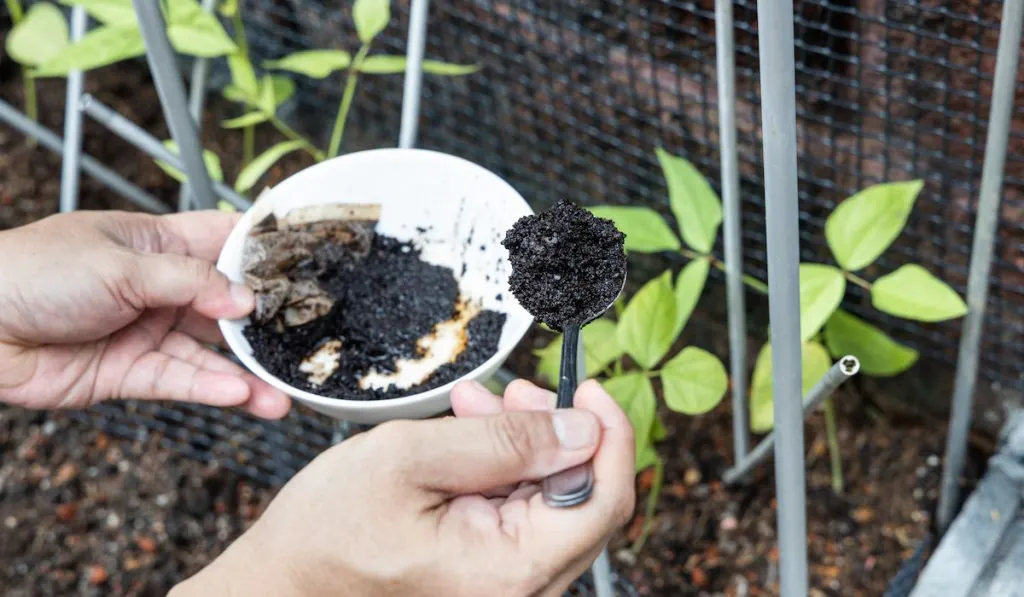
Mulching your roses with coffee grounds is an easy way to ensure that your roses get all the nitrogen they need.
Mulching neutralizes any remaining acidity in the grounds and provides a layer of protection for the roots and stems of your roses. It also prevents weed growth which means that you won’t have to worry about your roses being taken over by unwanted plants.
There are two ways to do this:
- You can mix up the coffee grounds with some decomposing leaves
- You can add the coffee grounds to manure mulch
Earthworms will eat up the organic matter and reduce it to rich soil, giving your roses a boost in nutrient levels.
Method 2: Coffee Grounds in the Compost Pile
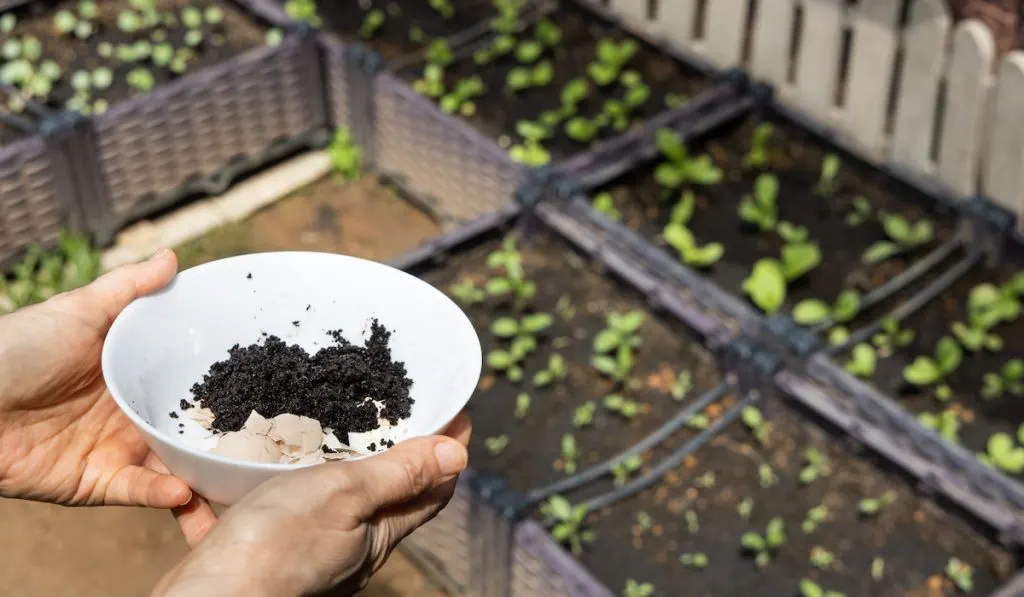
Coffee grounds are green waste and make nutritious compost like other kitchen scraps, garden trimmings, and dried leaves.
If you make compost for your garden, you can add the coffee grounds right there. They will balance the carbon from organic material with their high nitrogen content.
Add 1-2 inches of compost around the base of the plant; make sure you keep it a few inches away from the main stem. Compost can be added anytime, but it’s best to use in springtime after the rose plants come out of dormancy.
Method 3: Coffee Grounds as a Side Dressing
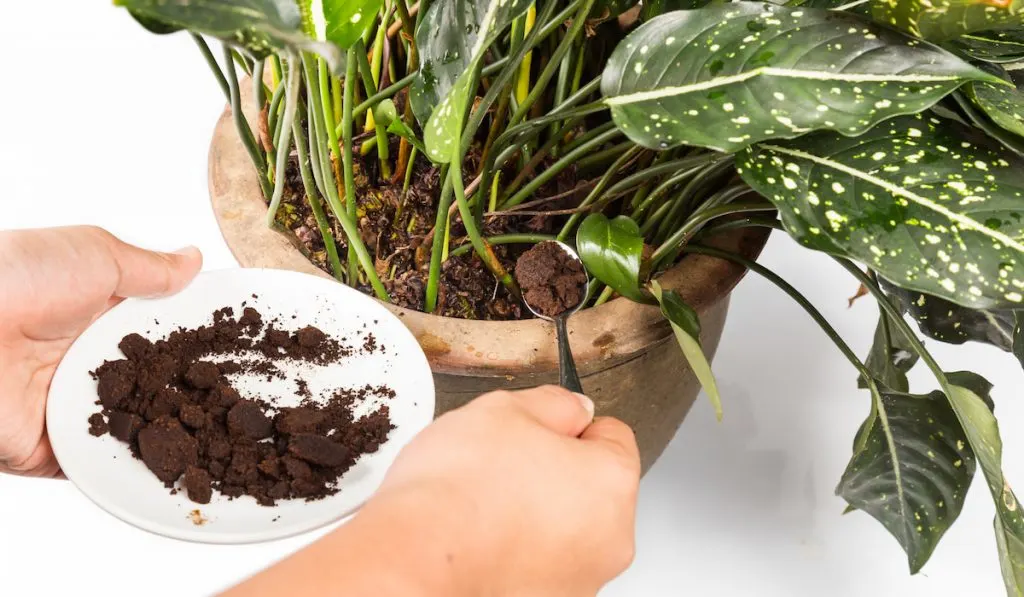
Side dressing is a method of applying fertilizer to the soil around the base of a rose plant. To give your rose bushes a quick nutritional boost, scatter a handful of coffee grounds around their base. Two cups or 500 grams of coffee grounds is enough for a few rose bushes.
This method works best in rainy regions where frequent showers will carry the nitrogen to the roots.
Method 4: Coffee Ground Tea
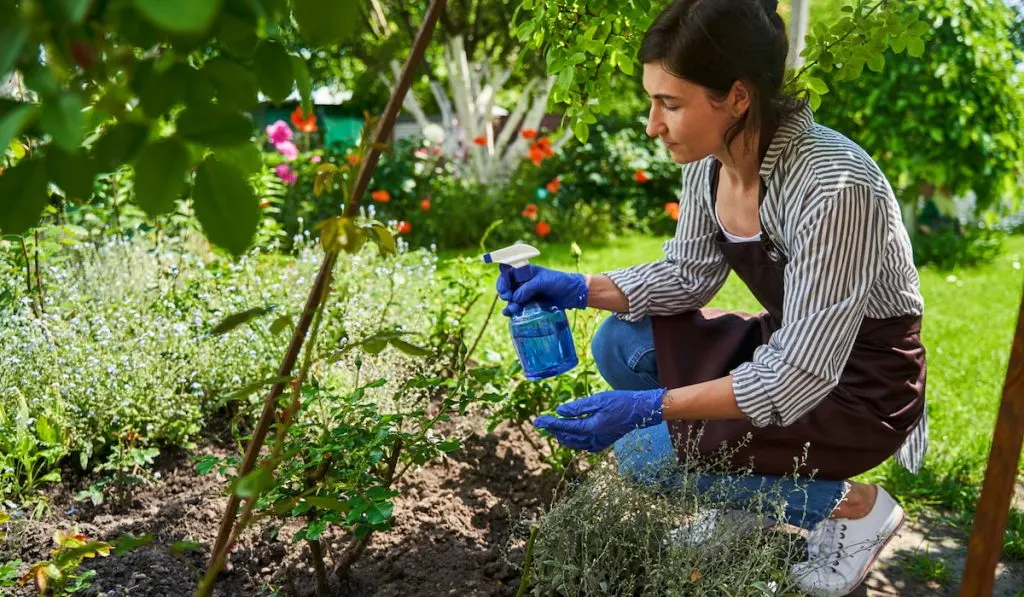
Another way to use coffee grounds is by making a liquid fertilizer.
Start with about 2 gallons (3.7 liters) of water and steep approximately 2 cups of coffee grounds for around an hour, then water your rose plants with this solution.
This is probably the fastest method to get the benefits of coffee grounds on your roses.
Again, never overdo on fertilizing. Coffee ground treatment once a year is enough to keep your roses happy.
Roses can be fertilized in spring and late fall after the frost. It is a good idea to check soil acidity levels before applying coffee grounds as a fertilizer.
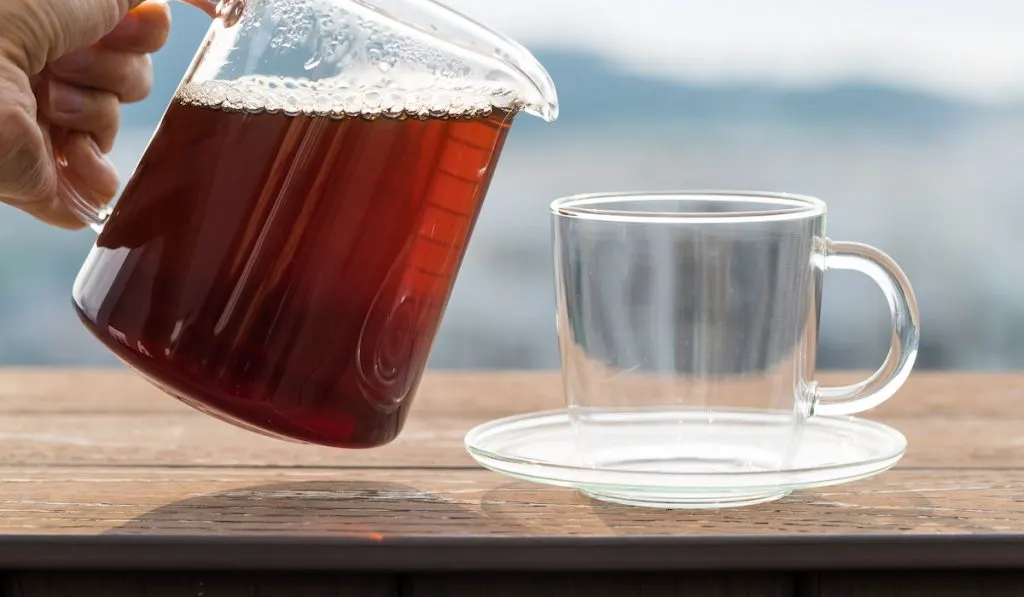
Can You Pour Coffee on Roses (Should You)?
Let’s do some simple math’; normal soil pH can range anywhere between 3.5 to 8.0, higher in rainy areas and lower in drier regions. Standard brewed coffee has a pH between 4.5 to 5.5, and roses thrive within a pH of 6 to 6.5.
So, you can water your roses with coffee, but we highly recommend not doing it if you already have acidic soil. But, of course, a little bit once in a while won’t hurt. If your brew is strong, dilute it with water to reduce the pH.
Here is a warning: Never pour sweetened or dairy-filled coffee into your garden. It doesn’t do any good for the plant, plus the sugars will become a feeding ground for pests and bugs. The cream can also sour in the heat, leaving a stinking mess.
Does the Type of Rose Matter?
All roses respond to the coffee ground fertilizer. The main reason is nitrogen, which is vital for roses to function and encourages new growth. It also helps balance other nutrients like carbon, phosphorus, and potassium.
Another reason is that earthworms and other soil protozoa love coffee grounds and will thrive in a coffee-filled compost.
They aerate the soil while also helping it retain moisture. Many plants get root rot problems because of compacted soils, so this will also solve that issue.
Let’s see how a few rose varieties respond to coffee grounds dressing:
- Desert Rose: A beautiful, warm-climate rose, it loves the neutral pH around 6, and adult plants don’t need much fertilizer. So just a few doses of coffee grounds once in a while will be more than enough.
- Knockout Roses: They are hardy, low-maintenance roses and make excellent hedges and bright accents in your garden. They love lots of nitrogen fertilizer to keep that fast growth, so coffee grounds are just perfect for them.
- Iceberg Roses: One of the most popular and low-maintenance roses, they can handle a wide variety of soils but have less tolerance towards nitrogen-deficient soils. So, coffee grounds will be ideal fertilizer for keeping them green and healthy.
- Climbing Roses: These fast growers love adequate feeding to stimulate growth. Nitrogen-Potassium-Phosphorous fertilizer is their favorite, and coffee grounds are rich in NPK content.
- Moss Roses: These plants live in neutral pH and can tolerate lean soil. But a good dose of nitrogen at planting time can give the necessary boost to grow a healthy plant.
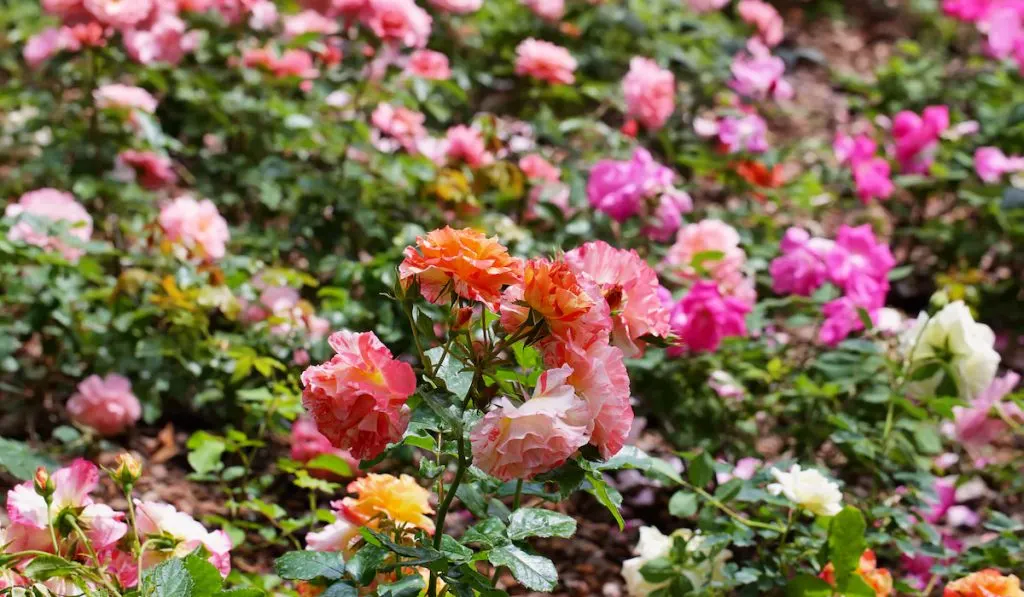
5 Other Plants That Like Coffee Grounds
Roses aren’t the only plants that benefit from coffee grounds. Many other plants also benefit from the nitrogen-rich content found in coffee grounds. The following are just a few of those plants:
- Clematis:
Clematis need rich soil to grow well, and nitrogen is essential for their growth. They benefit from both the acidic nature and nitrogen-rich content of coffee grounds. Therefore, a similar fertilizing routine like that of for roses applies to the clematis. - Rhododendrons:
Naturally, Rhodys are native to the acidic soils of mountainous and temperate lands. This makes them acidic soil-loving plants that benefit from the acidity of coffee grounds. - Hydrangeas:
Hydrangeas are very sensitive to soil pH. This is because they directly respond to acidity levels by changing the color of flowers; blue flowers for acidic soils and pink for alkaline soils. Coffee grounds can temporarily alter the soil’s pH level, so try out coffee grounds to grow magnificent blue hydrangeas in your garden. - Lilies:
Lilies need a decent dose of nitrogen to grow and flower. They grow well in acid soils with pH levels ranging from 5.5 to 6. Coffee grounds can help maintain the acidic conditions and nitrogen content in the soil, which is just perfect for lilies. - Spring bulbs:
Spring flowers like tulips, daffodils, crocus, etc., all need nitrogen in the growing season. They also require decent amounts of phosphate and potassium. Coffee grounds can help with all three and even add a good dose of organic matter to improve the soil texture.
Resources
- https://yardsurfer.com/coffee-grounds-for-roses
- https://www.gardenerreport.com/roses-coffee-grounds
- https://www.conserve-energy-future.com/are-coffee-grounds-good-for-roses
- https://thegardeningcook.com/coffee-grounds
- https://www.thespruce.com/watering-houseplants-with-coffee
- https://www.quora.com/How-would-coffee-grounds-affect-the-health-of-Knockout-roses
- https://www.webgardner.com/composting/do-clematis-like-coffee-grounds
- https://gardeningbank.com/do-rhododendrons-like-coffee-grounds
- https://gardeningbank.com/do-hydrangeas-like-coffee-grounds
- https://web.extension.illinois.edu/bulbs/planting
